Christopher Snowdon's Blog, page 266
February 23, 2012
Backing the USSR
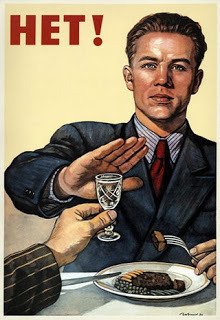
Chris Oakley has written a very interesting article at Liberal Vision about politically motivated doctors' groups attempting to emulate Soviet temperance campaigns.
In an academically inept, blatantly political piece published in The Lancet, a group of liver doctors who in their conceit, believe themselves experts on the causes of alcohol abuse rather than its consequences, propose Gorbachev's 1985 crackdown on alcohol in the Soviet Union as a template for alcohol control in the UK.
Go have a read. Fascinating history and a sound analysis.
On a barely related note, you can listen to me arguing with a plain pack proponent on BBC Radio Humberside earlier today (23 minutes in). Barely related because I mention the USSR right at the end. Hear here.
Published on February 23, 2012 21:08
February 22, 2012
Humorous magazine celebrates 20th anniversary
The Tobacco Control journal—soft, strong and thoroughly absorbent—is celebrating its 20th anniversary, although Anna Gilmore has been working on a computer model which claims it's actually been around for 1,000 years once you make adjustments. To commemorate this occasion, the organ has produced a free issue with a whole section on 'Endgame Visions'. 'Endgame' is the codeword for prohibition and will be featuring in the forthcoming 15th World Conference on Tobacco or [sic] Health. Book early to ensure disappointment, for it has such sessions as:
Whilst e-cigarettes spread around the world entirely by word of mouth and Sweden enjoys its snus-driven record low lung cancer rate, our prohibitionist friends will be sleepily contemplating such questions as...
I'm guessing their answer will be: "Yes, but only the stuff made by Pfizer and Johnston & Johnston."
Back at Tobacco Control, we have the same over-optimistic 'endgame' rhetoric, with articles entitled 'What are the elements of the tobacco endgame?' and 'How smoking became history: looking back to 2012'. Would it be impolite to mention that there are more people smoking today than ever before, or that there will be more people smoking tomorrow than today?
It just seems kind of weird to be talking about eliminating smoking when global consumption hits a new peak every day. And even if it wasn't, it's very brave of Stanton Glantz—a man renowned for being economical with the truth—to pen an article entitled 'Pinocchio shows how to end the tobacco epidemic' (I kid you not.)
This rich seam can wait till another day to be mined. For now, let's raise a glass and celebrate what Tobacco Control has been doing better than any other journal for two decades: publishing unspoofable, illiterate, policy-driven garbage under the mantle of science. You may have seen headlines like this yesterday:
Scientists, cool! I wonder if they are this sort of scientist?
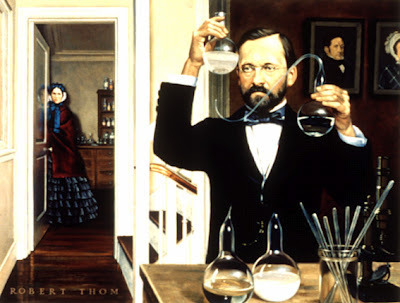
Or this sort of scientist?

Let's examine the credentials of our lead researcher:
This lady sounds, if anything, rather overqualified for Tobacco Control and, unusually for that journal, her study didn't involve typing in key phrases into Google. Instead, she interviewed real people. And not just people—actual smokers! Well, not actual smokers (you can't risk the thirdhand smoke), but social smokers.
Any fool can survey a dozen people to get the answer they want, but Professor Hoek didn't do that. She surveyed thirteen people to got the answer she wanted. Now, there are some people—cynics, sceptics, party-poopers and so on—who would say that if your sample group is in danger of being outnumbered by your research team, then perhaps you should have broadened the survey. Janet didn't feel the need to do that. She and her colleagues conducted "13 in-depth interviews with young adult social smokers aged between 19 and 25 years and used thematic analysis to interpret the transcripts."
The nay-sayers might tell you that the bit about "thematic analysis" is just a bit of guff to quell suspicions that this was a chat with a handful of impressionable young people who had been given $25 (New Zealand dollars) to talk to some anti-smoking folk. Nothing could be further from the truth. This is science. The woman has been trained in marketing, for flip's sake. She would never tried to manipulate anyone.
The subjects were all nonsmokers who had the occasional tab when they were on a night out. We all know people like this. They are the scourge of our city centres on a Friday and Saturday night. They are the people who have successfully given up buying cigarettes. As one respondent said:
Temperance campaigners will be pleased to hear that alcohol gets a fair bit of the blame, as this fantastically eloquent participant explains:
Another scrounging wretch is quoted as saying:
This phenomenon mentioned in that last comment is, of course, an unintended consequence of smoking bans, which helps explain why smoking bans do bugger all to reduce the smoking rate (as Spain has just found). In so far as we should change policy to accommodate these whiny misfits, it should be to relax smoking bans (as Hawaii has just done). This being Tobacco Control, however, that option is not just off the table, but has been knocked off the table, set on fire, stamped on and swept under the carpet. Instead...
Funnily enough, banning smoking outdoors just happens to be the 'next logical step' for the readers of Tobacco Control! What extraordinary serendipity that this piece of 'science' appears in 2012 just when it was needed for worldwide press release, despite being a dog's breakfast of half-witted statements of the obvious from New Zealand youth.
A moment's thought tells you that if smoking is banned outside pubs then the dwindling number of smokers who still go to pubs will stop altogether, and where will that leave their social smoking friends? Back home with the smokers drinking cheap beer and smoking endless cigarettes, that's where.
But that's just common sense and real-life understanding and, as such, has no place in the world's leading anti-tobacco comic. So, with its survey of thirteen inarticulate morons to guide policy, let's hear it for Tobacco Control as it moves into its third decade of lowering the intellectual standards of the Western world. Cheers!
09:00 – 10:30 - Endgame ideas: Dangerously radical, visionary leadership or both?
15:45 – 17:45 - Planning for a tobacco endgame
Whilst e-cigarettes spread around the world entirely by word of mouth and Sweden enjoys its snus-driven record low lung cancer rate, our prohibitionist friends will be sleepily contemplating such questions as...
11:00 – 12:20 - Harm reduction: Are there "safer products"?
I'm guessing their answer will be: "Yes, but only the stuff made by Pfizer and Johnston & Johnston."
Back at Tobacco Control, we have the same over-optimistic 'endgame' rhetoric, with articles entitled 'What are the elements of the tobacco endgame?' and 'How smoking became history: looking back to 2012'. Would it be impolite to mention that there are more people smoking today than ever before, or that there will be more people smoking tomorrow than today?
It just seems kind of weird to be talking about eliminating smoking when global consumption hits a new peak every day. And even if it wasn't, it's very brave of Stanton Glantz—a man renowned for being economical with the truth—to pen an article entitled 'Pinocchio shows how to end the tobacco epidemic' (I kid you not.)
This rich seam can wait till another day to be mined. For now, let's raise a glass and celebrate what Tobacco Control has been doing better than any other journal for two decades: publishing unspoofable, illiterate, policy-driven garbage under the mantle of science. You may have seen headlines like this yesterday:
Scientists call for smoke-free areas outside pubs
Scientists, cool! I wonder if they are this sort of scientist?

Or this sort of scientist?

Let's examine the credentials of our lead researcher:
Janet Hoek joined University of Otago Marketing Department in 2009; she was formerly a Professor of Marketing at Massey University. Her first degrees were in English Literature, with minors in Botany and Zoology, and her Masterate examined irony in Beowulf, a very early medieval poem. The weak employment market for medievalists prompted her move from the Dark Ages to the Dark Side, and she subsequently completed a post-graduate diploma in marketing and a PhD.
This lady sounds, if anything, rather overqualified for Tobacco Control and, unusually for that journal, her study didn't involve typing in key phrases into Google. Instead, she interviewed real people. And not just people—actual smokers! Well, not actual smokers (you can't risk the thirdhand smoke), but social smokers.
Any fool can survey a dozen people to get the answer they want, but Professor Hoek didn't do that. She surveyed thirteen people to got the answer she wanted. Now, there are some people—cynics, sceptics, party-poopers and so on—who would say that if your sample group is in danger of being outnumbered by your research team, then perhaps you should have broadened the survey. Janet didn't feel the need to do that. She and her colleagues conducted "13 in-depth interviews with young adult social smokers aged between 19 and 25 years and used thematic analysis to interpret the transcripts."
The nay-sayers might tell you that the bit about "thematic analysis" is just a bit of guff to quell suspicions that this was a chat with a handful of impressionable young people who had been given $25 (New Zealand dollars) to talk to some anti-smoking folk. Nothing could be further from the truth. This is science. The woman has been trained in marketing, for flip's sake. She would never tried to manipulate anyone.
The subjects were all nonsmokers who had the occasional tab when they were on a night out. We all know people like this. They are the scourge of our city centres on a Friday and Saturday night. They are the people who have successfully given up buying cigarettes. As one respondent said:
"so yeah, that's part of my rationalizing, if I'm not buying them, I'm not a smoker. If I'm only getting them off people, then it's not an issue. Because I'm not wasting my money."
Temperance campaigners will be pleased to hear that alcohol gets a fair bit of the blame, as this fantastically eloquent participant explains:
"Um, you're more relaxed so you don't really mind smoking. I dunno, somehow it makes it ... how do you say that, makes it easier to smoke somehow, I'm not sure how, yeah."
Another scrounging wretch is quoted as saying:
"well everyone else will be out smoking. You don't want to sit inside on your own and just drink so you're like ok, I'll jump up and have a ciggie with you."
This phenomenon mentioned in that last comment is, of course, an unintended consequence of smoking bans, which helps explain why smoking bans do bugger all to reduce the smoking rate (as Spain has just found). In so far as we should change policy to accommodate these whiny misfits, it should be to relax smoking bans (as Hawaii has just done). This being Tobacco Control, however, that option is not just off the table, but has been knocked off the table, set on fire, stamped on and swept under the carpet. Instead...
Because alcohol plays such a pivotal role in facilitating social smoking, extending smoke-free areas to the outside of bars would decouple drinking from smoking in this environment... Introducing smoke-free outdoor bars could reduce social smoking by removing cues that stimulate this behaviour and changing the environment that facilitates it. Such a policy would eliminate the current intersection between smoke-free and smoking spaces and create a physical barrier that, for some, would make accessing the smoking zone too difficult.
Funnily enough, banning smoking outdoors just happens to be the 'next logical step' for the readers of Tobacco Control! What extraordinary serendipity that this piece of 'science' appears in 2012 just when it was needed for worldwide press release, despite being a dog's breakfast of half-witted statements of the obvious from New Zealand youth.
A moment's thought tells you that if smoking is banned outside pubs then the dwindling number of smokers who still go to pubs will stop altogether, and where will that leave their social smoking friends? Back home with the smokers drinking cheap beer and smoking endless cigarettes, that's where.
But that's just common sense and real-life understanding and, as such, has no place in the world's leading anti-tobacco comic. So, with its survey of thirteen inarticulate morons to guide policy, let's hear it for Tobacco Control as it moves into its third decade of lowering the intellectual standards of the Western world. Cheers!
Published on February 22, 2012 07:30
February 20, 2012
Argumental
I've done a number of interviews today re: the Adam Smith Institute plain packaging report. Here's two of them...
Firstly, versus Deborah Arnott of ASH on the Today programme.
Secondly, versus a woman from CRUK on Victoria Derbyshire's Five Live show (from 1 hour 10 minutes in).
Firstly, versus Deborah Arnott of ASH on the Today programme.
Secondly, versus a woman from CRUK on Victoria Derbyshire's Five Live show (from 1 hour 10 minutes in).
Published on February 20, 2012 15:16
Plain Packaging: Commercial expression, anti-smoking extremism and the risks of hyper-regulation
Today promises to be a bumper 24 hours of annoying prohibitionists, for it is the day the Adam Smith Institute publishes a paper I wrote about the ridiculous plain packaging proposals. I'll post the link to the report later but, for now, here is the Adam Smith Institute's press release.
ASH got hold of the report early doors and came up with their own press release on Friday...
The Adam Smith Institute has in turn responded to the 'Big Tobacco' allegation...
The British Medical Journal asked for a response from me so I sent them this. As they probably won't publish it, I'll post it here:
Fun and games...
Government's plain packaging proposals for cigarettes will bring no benefits to public
• There is no evidence that the proposals will reduce consumption or give any public health benefit.
• Plain packaging may lead to an increase in the counterfeit cigarette trade, making cheap tobacco more easily available to young would-be smokers.
• The policy creates a dangerous precedent – plain packaging could be extended to other products such as alcohol and fatty foods.
Ahead of a public consultation on the plain-packaging of cigarettes, the Adam Smith Institute have released a report today (Monday) arguing that the proposals will do nothing for public health and are profoundly illiberal. There is no evidence that plain packaging will have any effect on existing smokers or the smoking rate. The policy represents a desperate attempt by the public health lobby and government officials to be seen as 'clamping down' on tobacco in an increasingly maniacal war on smoking.
No Health Benefits
The plain packaging rule is aimed at stopping non-smokers from making a decision to engage in a habit. However, there is no evidence that the colour and logos on a pack of cigarettes is an influencing factor on people choosing to start smoking. Indeed, in the case of increasing the graphic warnings on packs, a comprehensive Canadian study found that "the warnings have not made a discernable impact on smoking prevalence". Previous studies show that packaging design does little to impact the smoking rate.
Smoking numbers have not changed since 2007 with the rise of the 'denormalisation' of tobacco and aggressive anti-smoker policies. Aggressive anti-smoking policies don't appear to work. Furthermore, plain packaging has been recognised as the weakest and least popular of ASH's (Action on Health and Smoking) 12 anti-smoking policies proposed in 2008.
The Slippery Slope
Apart from the lack of health benefits there is also the risk that such a policy would be introduced for alcohol, fatty foods or sugary drinks. What happens today in tobacco tends to happen to other unhealthy products tomorrow. In fact, this slippery slope trend has already started in Australia, where they are currently planning to introduce plain packaging. As soon as the Australian government had approved the policy they swiftly moved on to look at how this could be applied to alcohol. Once plain packaging is enshrined in law for tobacco it will be easily extended to other lifestyle choices. That's why the Adam Smith Institute argues the nanny state juggernaut must be stopped in its tracks.
Counterfeiting and intellectual property
In order to introduce plain packaging the government would need to breach international trade rules and confiscate tobacco companies' intellectual property, without any proof that this would yield public health benefits. Furthermore, there is reason to believe the policy will have a negative effect both on public health and the tobacco industry.
Already 1 in 9 cigarettes around the world is counterfeit, with counterfeit cigarettes often having two to three times the level of heavy metals found in legitimate brands. Plain packaging will mean the standardising of cigarette packaging, which will help illicit trade. The policy is likely to boost the black market in the UK, offering cheaper cigarettes more likely to lure young and new customers. Any illicit trade can only hinder efforts to reduce smoking, so plain packaging proposals may in reality be damaging for public health.
Plain packaging, if introduced, would be a triumph of a dogmatic minority over the public. It would be an indiscriminate, illiberal law with no basis in evidence, reason or commonsense, whilst masquerading as a public health initiative. Author of the report Plain Packaging: Commercial expression, anti-smoking extremism and the risks of hyper-regulation, Christopher Snowdon, adds:
"It is extraordinary that a government which claims to be against excessive regulation should be contemplating a law which even the provisional wing of the anti-smoking lobby considered unthinkable until very recently. It seems that fanaticism has become institutionalised and a handful of extremists have become the de facto policy makers in matters related to tobacco. The public are gradually waking up to the fact that these neo-prohibitionists will never be satisfied. There is always another cause to campaign for, always new demands to be met. If it is not smoking, it is drinking. If it is not drinking, it is eating.
Plain packaging is the most absurd, patronising and counterproductive policy yet advanced under the disingenuous pretext of 'public health'. It will serve only to inconvenience retailers, stigmatise consumers and delight counterfeiters. Those who would dictate what we eat and drink are already incorporating plain packaging into their plans. It's time to say 'Enough.' The monomaniacs have had their own way for too long."
ASH got hold of the report early doors and came up with their own press release on Friday...
Tobacco industry "invisible hand" behind Adam Smith Institute 'plain packs' report
A report by the Adam Smith Institute published today in advance of a public consultation on tobacco packaging advances the views of the tobacco industry, namely that putting cigarettes in plain standardised packaging would have no public health benefit, would increase the illicit trade in tobacco and would set a "dangerous precedent" for other products.
All of these arguments misrepresent the truth and ignore the fact that glitzy packs are designed to attract new young smokers to replace the100,000 in the UK who are killed each year by their habit.
Firstly, there is now a large body of evidence to show that plain packaging will be effective. Experimental studies and surveys from around the world show that plain packs are less appealing, strengthen the impact of the health warnings, and make the packs less misleading.
Secondly, there is no evidence that plain packaging will lead to an increase in tobacco smuggling. Existing packs are already easily counterfeited. Plain packs will still have to have covert markings, tax stamps and health warnings that are required on current packs so they will be no easier to counterfeit. And the argument that it will "breach international trade rules and confiscate tobacco companies' intellectual property" is also fallacious, according to the tobacco industry's own legal advice, revealed in litigation.
Thirdly, the "domino theory" i.e. that once a measure has been applied to tobacco it will be applied to other products is patently false. The same argument was used against the ban on tobacco advertising, but 9 years after the tobacco ban in the UK, alcohol advertising is still permitted with no sign of it being prohibited. Tobacco is a uniquely dangerous consumer product which is why there is a WHO health treaty (the Framework Convention on Tobacco Control) to regulate tobacco use.
Deborah Arnott, Chief Executive of ASH commented:
"Why would the tobacco industry and its allies be so vehemently opposed to plain packaging if they weren't so frightened that plain packaging would work? [Er, if you read the report, you'll find out—CJS] The Adam Smith Institute, by publishing this report, is acting as the mouthpiece for the tobacco industry, as it has done on many previous occasions. It should come as no great surprise that the Institute takes a pro-tobacco line but it should be more transparent about its association with Big Tobacco."
The Adam Smith Institute has in turn responded to the 'Big Tobacco' allegation...
We commissioned this report ourselves because it reflects our free market, libertarian ideology. Indeed, the Adam Smith Institute does not do commissioned research.
However, there are a couple of tobacco companies that have corporate subscriptions at the Institute. The revenue from this – while welcome – is not terribly significant. It amounted to less than 3 percent of our 2011 income. Moreover, neither of these companies has played any role whatsoever in the production or editing of this report. We take our independence very seriously.
The British Medical Journal asked for a response from me so I sent them this. As they probably won't publish it, I'll post it here:
I'm pleased that Action on Smoking and Health (ASH) are familiar with Adam Smith's "invisible hand" concept despite their obvious contempt for free markets and free societies. As usual, they offer not a shred of evidence that plain packaging will deter people from smoking. Their claim that counterfeiters' lives will not be made easier by making cigarette packs look virtually identical is as credible as their belief that plain packaging will not inconvenience retailers.
ASH say that it is "patently false" to think that "once a measure has been applied to tobacco it will be applied to other products". Have they been living in a cave for the past five years? The British Medical Association is currently demanding that graphic warnings be placed on wine bottles. Where does ASH suppose they got that idea from? The BMA also wants - in their own words - "a complete ban on [alcohol] advertising as has been done very successfully with tobacco." Activists in Australia are already calling for junk food to be sold in plain packaging. Rather than denying these facts, ASH should be proud that they are blazing a trail for busybodies, cranks and authoritarians of all varieties.
Fun and games...
Published on February 20, 2012 00:01
February 19, 2012
A prohibitionist writes
Are you ready? Then we'll begin.
Abolish the Food Industry
Bang! That's the headline of this piece from The Atlantic . It sprang from the biro of Raj Patel. Dick Puddlecote's readers may recall the name. He thinks that each hamburgers "costs" society $200 in terms of environmental destruction and obesity. That is nonsense but, as we shall see, nonsense is Mr Patel's middle name.
He begins his article with a line of which the Daily Mash would be proud...
Isn't that beautiful? I wish I'd thought of that. The essence of both "progressives" and the city of San Francisco encapsulated in one simple sentence.
He is referring to a ban on pharmacies selling cigarettes. This leads him to discuss tobacco advertising...
The first Joe Camel advertisement appeared in 1988, but never mind.
He then moves seamlessly onto alcohol...
And then comes the kicker...
A very familiar argument, of course—the proverbial slippery slope. Last week we saw a textbook case of how one ban on "corporations' advertising to kids" snowballs; see JuliaM's post at Orphans of Liberty. Patel's article is one long attempt to blur the distinction between products while rehabilitating the reputation of prohibition. After giving a shout out to last month's risible 'toxic sugar' article, he brings his argument to its logical conclusion.
Boom! He gets from a ban on cigarettes in pharmacies to the abolition of the food industry in three easy steps. This is world-class stuff.
No fooling.
More than you might think, Raj. Take Robert Proctor, for example, who has recently published a weighty tome about smoking in which he calls for tobacco prohibition. Patel very much admires Proctor, of course, but dare not mention the P word. Instead, he talks about 'abolition'.
See, he's not one of those nasty prohibitionists. The very idea!
Gee, thanks. Nice of you to compromise on that, Proctor.
Look, here's the thing. People were free to make their own alcohol during Prohibition. Drinking was never illegal. Prohibition "only" outlawed was the sale, import and manufacture of alcohol. Just like Proctor, the prohibitionists blamed an industry for a habit which they detested. They thought that if they put the industry out of business, drinking would virtually disappear. They couldn't imagine that people drank because they liked it, just as today's tobacco prohibitionists cannot imagine that people smoke because they like it.
There is no difference whatsoever between Proctor's position and the position of the Anti-Saloon League. Indeed, the Anti-Saloon League was more moderate in that they allowed alcohol to be sold under certain conditions (religious ceremonies, medical use etc.). Proctor is, in the most literal sense, a prohibitionist.
And so is Patel...
What fresh sophistry is this? Free speech makes us less free? This is the rhetoric of every totalitarian—that "true" freedom comes from restricting freedom. That speech should be free unless the government doesn't like what is being said.
The food industry is not an oligopoly. Their are millions of farms, millions of individual retailers and millions of independently owned restaurants. The very fact that food is so cheap is a reflection of the competitive market. If you don't like McDonald's and Tesco, you can go to a fruit and veg stall or your local restaurant. The barriers to entry are low.
Extending Proctor's arguments would mean abolishing the food industry while leaving us "free" to grow our own food, just as we will be "free" to grow our own tobacco. This is the kind of half-witted back-to-the-land garbage we hear from the New Economics Foundation and other upper-middle class misanthropists. Half the world would be "free" to live like medieval serfs and the other half would be free to starve. Get thee behind me, Patel.
Abolish the Food Industry
Bang! That's the headline of this piece from The Atlantic . It sprang from the biro of Raj Patel. Dick Puddlecote's readers may recall the name. He thinks that each hamburgers "costs" society $200 in terms of environmental destruction and obesity. That is nonsense but, as we shall see, nonsense is Mr Patel's middle name.
He begins his article with a line of which the Daily Mash would be proud...
In the fall of 2008, San Francisco polished its progressive credentials by banning something.
Isn't that beautiful? I wish I'd thought of that. The essence of both "progressives" and the city of San Francisco encapsulated in one simple sentence.
He is referring to a ban on pharmacies selling cigarettes. This leads him to discuss tobacco advertising...
Joe Camel isn't familiar to children today, as he was in the 1970s
The first Joe Camel advertisement appeared in 1988, but never mind.
He then moves seamlessly onto alcohol...
Alcohol is similarly circumscribed, again with an eye to public health and, again, with a particular concern for young people.
And then comes the kicker...
But if public health is a legitimate reason to curb corporations' advertising to kids, why limit bans to cigarettes and booze, and not include, say, unhealthy food?
A very familiar argument, of course—the proverbial slippery slope. Last week we saw a textbook case of how one ban on "corporations' advertising to kids" snowballs; see JuliaM's post at Orphans of Liberty. Patel's article is one long attempt to blur the distinction between products while rehabilitating the reputation of prohibition. After giving a shout out to last month's risible 'toxic sugar' article, he brings his argument to its logical conclusion.
Why allow an industry that profits from the sale of unhealthy food at all?
Boom! He gets from a ban on cigarettes in pharmacies to the abolition of the food industry in three easy steps. This is world-class stuff.
The history of banning things is admittedly inglorious.
No fooling.
The war on drugs, Prohibition, and censorship have few fans.
More than you might think, Raj. Take Robert Proctor, for example, who has recently published a weighty tome about smoking in which he calls for tobacco prohibition. Patel very much admires Proctor, of course, but dare not mention the P word. Instead, he talks about 'abolition'.
[Proctor] doesn't want to ban smoking. The language of abolition -- not prohibition -- is well chosen. Proctor doesn't yearn for the criminalization of smokers, nor does he foresee the end of cigarettes or tobacco.
See, he's not one of those nasty prohibitionists. The very idea!
He's simply arguing that the industry that profits from it oughtn't to exist in a society that has a minimum concern with public health. If you want to smoke, you're free to grow and cure your own tobacco, he suggests.
Gee, thanks. Nice of you to compromise on that, Proctor.
Look, here's the thing. People were free to make their own alcohol during Prohibition. Drinking was never illegal. Prohibition "only" outlawed was the sale, import and manufacture of alcohol. Just like Proctor, the prohibitionists blamed an industry for a habit which they detested. They thought that if they put the industry out of business, drinking would virtually disappear. They couldn't imagine that people drank because they liked it, just as today's tobacco prohibitionists cannot imagine that people smoke because they like it.
There is no difference whatsoever between Proctor's position and the position of the Anti-Saloon League. Indeed, the Anti-Saloon League was more moderate in that they allowed alcohol to be sold under certain conditions (religious ceremonies, medical use etc.). Proctor is, in the most literal sense, a prohibitionist.
And so is Patel...
...our food choices are far from free, in no small part because of the commercial and cultural power of the food industry. Weaned as most of us are on Big Food's free speech, we ought to be suspicious of our instincts when it comes to food.
What fresh sophistry is this? Free speech makes us less free? This is the rhetoric of every totalitarian—that "true" freedom comes from restricting freedom. That speech should be free unless the government doesn't like what is being said.
The food industry is an oligopoly that has transformed not only what we eat but how we eat it, and what we think of food.
The food industry is not an oligopoly. Their are millions of farms, millions of individual retailers and millions of independently owned restaurants. The very fact that food is so cheap is a reflection of the competitive market. If you don't like McDonald's and Tesco, you can go to a fruit and veg stall or your local restaurant. The barriers to entry are low.
Extending Proctor's argument to those very corporate powers invites us to imagine what a world without Big Food might look like -- and dream ourselves freer still.
Extending Proctor's arguments would mean abolishing the food industry while leaving us "free" to grow our own food, just as we will be "free" to grow our own tobacco. This is the kind of half-witted back-to-the-land garbage we hear from the New Economics Foundation and other upper-middle class misanthropists. Half the world would be "free" to live like medieval serfs and the other half would be free to starve. Get thee behind me, Patel.
Published on February 19, 2012 10:29
February 17, 2012
Minimum pricing: what to expect
The ChaMPs Public Health Network—founded in 2003, entirely state-funded and involved in the dodgy minimumpricing.info website—is one of several arms of government working to impose minimum pricing on the public.
You will be hearing a lot of cant and nonsense about this scheme in the next few months as the Department of Health/British Medical Association PR machine turns up the throttle. The tone of the discussion can be gauged from a meeting hosted by ChaMPs in 2010 when the usual lies were presented as facts. For example, they said that the price of alcohol has fallen in real terms since 1980. In fact, alcohol has risen by 20% in real terms. Either they don't know what 'real terms' means, or they are willfully misleading the public.
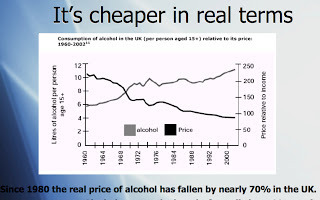 No, it's not.
No, it's not.
The interesting thing about this meeting is that the attendees were quite aware of all the drawbacks of minimum pricing. They worried that the policy...
Yes, "still". But not if they get their way, because the anti-smoking blueprint of denormalisation remains their template...
It's interesting to note that, in contrast to absurd claims that minimum pricing will "save nearly 10,000 lives a year", this meeting found that...
Several of the criticisms of minimum pricing made on this blog and elsewhere over the last two years also feature...
They were also worried that their cost estimates, though vastly inflated, did not appear big enough.
Their answer to this problem acts as a golden rule for the whole campaign.
And I'm sure you will.
You will be hearing a lot of cant and nonsense about this scheme in the next few months as the Department of Health/British Medical Association PR machine turns up the throttle. The tone of the discussion can be gauged from a meeting hosted by ChaMPs in 2010 when the usual lies were presented as facts. For example, they said that the price of alcohol has fallen in real terms since 1980. In fact, alcohol has risen by 20% in real terms. Either they don't know what 'real terms' means, or they are willfully misleading the public.
 No, it's not.
No, it's not.The interesting thing about this meeting is that the attendees were quite aware of all the drawbacks of minimum pricing. They worried that the policy...
Could stimulate adverse publicity. Alcohol is still socially acceptable.
Yes, "still". But not if they get their way, because the anti-smoking blueprint of denormalisation remains their template...
Help culture change and cover the whole population (like the tobacco agenda)
Need to find ways of making alcohol less socially acceptable and seen as a public problem. (Lessons learned from Smoke Free).
It's interesting to note that, in contrast to absurd claims that minimum pricing will "save nearly 10,000 lives a year", this meeting found that...
Evidence of a positive impact would be hard to find as alcohol has such a long term impact on health.
Several of the criticisms of minimum pricing made on this blog and elsewhere over the last two years also feature...
Would there be a risk that harmful drinkers move on to replacement risky behaviours? They many neglect buying healthy food in preference to alcohol for example. Could increase the gap in health inequalities
Is there risk it will encourage more people to experiment with home brewing?
Legislation in itself will not impact on attitudes of high level drinkers and doesn't tackle the reasons why people drink.
They were also worried that their cost estimates, though vastly inflated, did not appear big enough.
Cost benefits quoted don't sound very impressive (12.9 billion over 10 years saved against 20 billion per year cost).
Their answer to this problem acts as a golden rule for the whole campaign.
We need to be careful which statistics and messages we are using if we are to convince and not undermine.
And I'm sure you will.
Published on February 17, 2012 11:24
February 16, 2012
More movie madness
Last night I watched Bridesmaids (it's pretty good). I didn't notice any smoking in it, but then I'm not a wide-eyed obsessive living in terror of a waft of on-screen smoke. Apparently, however, at least one person does smoke at some point because the film is named and shamed in Stanton Glantz's latest work of pseudo-academia. According to the great mechanical engineer, the movie has delivered 60,020,706 "tobacco impressions" and so has led to hundreds, if not thousands, of youngsters to suddenly taking up the habit.
Welcome to the world of SmokeFree Movies, Glantz's quixotic campaign to banish tobacco from our screens (for the children, natch). Despite years of being ridiculed and ignored on this issue, Stan is continuing his crusade and has written yet another paper on the subject (he has written a lot).
Today, he claims that 100,000 Californian 12-17 year olds are smokers as a direct result of seeing smoking in the movies. This is a figure that he alone invented and which even hardcore anti-smoking head-bangers like Simon Chapman find laughable.
He also claims that these 100,000 people will cost the taxpayer $1.6 billion. This figure is based on a total misrepresentation of the academic literature and a fundamental misunderstanding of externalities and social costs. As I hope you know by now, it is doubtful that smokers incur any net costs on other taxpayers, but even if they do, they are vastly outweighed by revenue from tobacco taxes (see here for a refresher).
This is all bog-standard junk from the godfather of junk science. The real bees in Stanton's bonnet are the taxpayer subsidies of Hollywood films which show a practice of which he disapproves. They must stop, he says. There will be no more smoking in the movies on his watch and he has a plan to do something about it:
You will note that this only applies to smoking. Movies showing homicide, rape, drug abuse, drinking, speeding, violence and wife-beating will continue to receive their subsidies.
Or at least they will for now. If the government takes heed of the mechanic, we can be sure that drinking will be in the firing line, with minor vices such as mass murder and incest following in due course. This is sheer, unbridled, censorious puritanism. Note that smoking and tobacco paraphernalia cannot even be referred to under Stan's regime! Film scripts will not be allowed to include words like 'cigarette' or 'pipe'.
Even the word 'e-cigarette' will be verboten because the proposed ban includes all "non-pharmaceutical nicotine delivery device". Why not include all nicotine products? Cynics would say it's because SmokeFree Movies was founded with money from Johnson & Johnson, the makers of various 'nicotine replacement therapies', and continues to receive grants from the company's philanthropic wing the Robert Wood Johnson Foundation.
The good news is that this proposal is too nuts even for California. Glantz can stamp his feet all he likes, but the movie industry rightly perceives him as a crank and we can assume he will continue to be shown the door. We must certainly hope so, for if monomaniacs like him ever gain a stranglehold on the creative arts, it will be another nail in the coffin of the free society.
Welcome to the world of SmokeFree Movies, Glantz's quixotic campaign to banish tobacco from our screens (for the children, natch). Despite years of being ridiculed and ignored on this issue, Stan is continuing his crusade and has written yet another paper on the subject (he has written a lot).
Today, he claims that 100,000 Californian 12-17 year olds are smokers as a direct result of seeing smoking in the movies. This is a figure that he alone invented and which even hardcore anti-smoking head-bangers like Simon Chapman find laughable.
He also claims that these 100,000 people will cost the taxpayer $1.6 billion. This figure is based on a total misrepresentation of the academic literature and a fundamental misunderstanding of externalities and social costs. As I hope you know by now, it is doubtful that smokers incur any net costs on other taxpayers, but even if they do, they are vastly outweighed by revenue from tobacco taxes (see here for a refresher).
This is all bog-standard junk from the godfather of junk science. The real bees in Stanton's bonnet are the taxpayer subsidies of Hollywood films which show a practice of which he disapproves. They must stop, he says. There will be no more smoking in the movies on his watch and he has a plan to do something about it:
The policy solution is to amend the California tax credit program statute, adding the following to the existing list of productions disqualified from eligibility for subsidy: "…any production that depicts or refers to any tobacco product or non-pharmaceutical nicotine delivery device or its use, associated paraphernalia or related trademarks or promotional material."
You will note that this only applies to smoking. Movies showing homicide, rape, drug abuse, drinking, speeding, violence and wife-beating will continue to receive their subsidies.
Or at least they will for now. If the government takes heed of the mechanic, we can be sure that drinking will be in the firing line, with minor vices such as mass murder and incest following in due course. This is sheer, unbridled, censorious puritanism. Note that smoking and tobacco paraphernalia cannot even be referred to under Stan's regime! Film scripts will not be allowed to include words like 'cigarette' or 'pipe'.
Even the word 'e-cigarette' will be verboten because the proposed ban includes all "non-pharmaceutical nicotine delivery device". Why not include all nicotine products? Cynics would say it's because SmokeFree Movies was founded with money from Johnson & Johnson, the makers of various 'nicotine replacement therapies', and continues to receive grants from the company's philanthropic wing the Robert Wood Johnson Foundation.
The good news is that this proposal is too nuts even for California. Glantz can stamp his feet all he likes, but the movie industry rightly perceives him as a crank and we can assume he will continue to be shown the door. We must certainly hope so, for if monomaniacs like him ever gain a stranglehold on the creative arts, it will be another nail in the coffin of the free society.
Published on February 16, 2012 00:09
February 14, 2012
Why are we paying for this? (part 2)
A new website has appeared under the domain www.minimumpricing.info which pushes the case for a minimum unit price of alcohol and invites people to "sign up" to "make minimum pricing law".
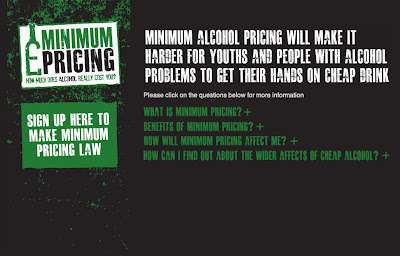
The website provides information which is misleading at best. An interactive panel allows users to see how much alcohol will cost if the legislation is introduced. In the case of a cheap bottle of wine, for example...
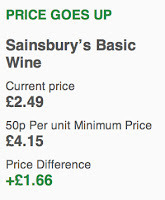
Fair enough. The price will go up. That is the point. But is it really honest to state that the price of more expensive drinks will go down?
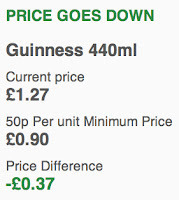
PRICE GOES DOWN? It won't, will it? If anything, minimum pricing will encourage premium brands to charge more. If a half decent £4.15 bottle of wine costs the same as much as a horrible bottle of £2.49 plonk, the former can surely get away with charging £5.
This is routine deviousness on the part of the temperance lobby, but it is not the reason for this post. What is really of interest here is where this website came from and who paid for it. It has no contact details and no branding. Although one might suspect the hand of the NHS, Alcohol Concern or the Department of Health at work, none of their logos appear.
Perhaps it is the work of some concerned citizen? Unlikely. Although small, the website is too elaborate to be the work on a lone temperance nut. The domain name was registered by a swanky marketing agency based in the North West and it seems to be linked to the chap below, who is an 'Alcohol Strategic Lead', also based in the North West (come friendly cuts and fall on thee).

If you take the advice of the website and "Sign up here to make minimum pricing law", you will hit an external link and be taken to the website of DrinkWise NorthWest where you will be given the opportunity to 'Join the Movement'. DrinkWise NorthWest is entirely funded by the NHS and local authorities.
It is, I think, fair to say that www.minimumpricing.info has been paid for with taxpayers money to lobby for a change in the law. DrinkWise NorthWest is an arm of the government. Why is it spending money lobbying the government? Why, indeed, is the government—which has supposedly not made its mind up about minimum pricing—allowing taxpayers' money to be spent on an astro-turfing project designed to get people to sign up to a "movement".
Regular readers will be familiar with fake charities and state-funded NGOs masquerading as 'civil society'. It might take a little homework to find out that ASH, Alcohol Concern, Friends of the Earth, Brake, Sustain et al. are largely dependent on statutory funding for their existence, but it can be done. This website is not unusual in using government money to lobby for policy, but it is unusual in that it is doing so anonymously and without disclosing the source of the campaign.
If this is not against the rules then the rules are worthless.

The website provides information which is misleading at best. An interactive panel allows users to see how much alcohol will cost if the legislation is introduced. In the case of a cheap bottle of wine, for example...

Fair enough. The price will go up. That is the point. But is it really honest to state that the price of more expensive drinks will go down?

PRICE GOES DOWN? It won't, will it? If anything, minimum pricing will encourage premium brands to charge more. If a half decent £4.15 bottle of wine costs the same as much as a horrible bottle of £2.49 plonk, the former can surely get away with charging £5.
This is routine deviousness on the part of the temperance lobby, but it is not the reason for this post. What is really of interest here is where this website came from and who paid for it. It has no contact details and no branding. Although one might suspect the hand of the NHS, Alcohol Concern or the Department of Health at work, none of their logos appear.
Perhaps it is the work of some concerned citizen? Unlikely. Although small, the website is too elaborate to be the work on a lone temperance nut. The domain name was registered by a swanky marketing agency based in the North West and it seems to be linked to the chap below, who is an 'Alcohol Strategic Lead', also based in the North West (come friendly cuts and fall on thee).

If you take the advice of the website and "Sign up here to make minimum pricing law", you will hit an external link and be taken to the website of DrinkWise NorthWest where you will be given the opportunity to 'Join the Movement'. DrinkWise NorthWest is entirely funded by the NHS and local authorities.
It is, I think, fair to say that www.minimumpricing.info has been paid for with taxpayers money to lobby for a change in the law. DrinkWise NorthWest is an arm of the government. Why is it spending money lobbying the government? Why, indeed, is the government—which has supposedly not made its mind up about minimum pricing—allowing taxpayers' money to be spent on an astro-turfing project designed to get people to sign up to a "movement".
Regular readers will be familiar with fake charities and state-funded NGOs masquerading as 'civil society'. It might take a little homework to find out that ASH, Alcohol Concern, Friends of the Earth, Brake, Sustain et al. are largely dependent on statutory funding for their existence, but it can be done. This website is not unusual in using government money to lobby for policy, but it is unusual in that it is doing so anonymously and without disclosing the source of the campaign.
If this is not against the rules then the rules are worthless.
Published on February 14, 2012 10:56
Kiss this
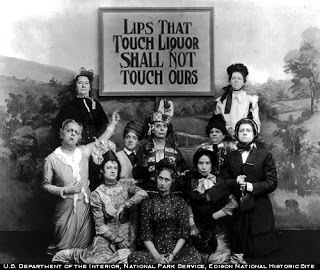
In these times of austerity, with Greece in flames and the UK in mind-boggling debt, it's reassuring to know that the Department of Health still has money for crucial, front-line services such as commissioning surveys about who people want to kiss.
To boost your chances of dating success this Valentine's Day quit the fags, suggests a poll that shows smoking is one of the biggest turn-offs.
Three-quarters of people aged 18 to 24 said they would not kiss someone who had just smoked.
And half the 1,700 people surveyed for the Department of Health (DoH) said they would think twice about starting a serious relationship with a smoker.
I'm married and I hate young people so I have no dog in this fight, but is this really the best the DoH can do? This is just a reworking of the old "lips that touch liquor will never kiss mine" meme from the 19th century.
I don't care. Smokers can pair off with smokers and nonsmokers can pair off with nonsmokers. Kiss who you want. It's none of the Department of Health's business.
Is there no day of the year on which these inane, pontificating pricks can leave us alone?
 Less competition for us real men.
Less competition for us real men.
Published on February 14, 2012 01:12
February 13, 2012
Why are we paying for this? (part 1)
Dave Atherton has some news which contradicts an answer given in the House of Lords last April when we were told that ASH had not applied for government funding and there were no plans to give them any.
Now, however, Lord Howe has told Mr Atherton:
And so taxpayers are once more compelled to fund a pressure group whose views may be at odds with their own. Ministers of Health have repeatedly denied that these grants are used to lobby, but ASH does not seem to do anything except lobby. A legalistic defence could perhaps be made by referring to 'advocacy' (which is permitted under law), but no one seems to be able to provide a convincing explanation of how advocacy for new laws differs from lobbying.
The coalition government has cut its spending on charities in the last two years. Many of these charities are political by nature and do not provide charitable services as the public generally understands the term. What they do would be illegal in countries like the USA, where lobby groups cannot be funded by the state.
What we have seen in Britain over the last fifteen years is a politicisation of 'civil society' and the rise of state-funded astro-turfing. Under the leadership of Suzi Leather, the Charities Commission has actively encouraged NGOs to campaign while the government has encouraged them to take statutory funding. It should be no surprise that this subverts and undermines democracy. That was surely the intention. When businesses do this, we call them what they are: front groups. A change of government at a time of austerity might have done something about this, but it seems that the Department of Health remains a law unto itself.
ASH did not make a grant application to the department's Third Sector Investment Programme: Innovation, Excellence and Service Development Fund for 2011-12. The department currently has no other plans to provide ASH with funding in the next financial year.
Now, however, Lord Howe has told Mr Atherton:
At the time of Lord Howe's statement, no decision has been made about whether to award a Section 64 grant to Action on Smoking and Health for 2011-2012. A grant of £150,000 has subsequently been awarded to ASH for work to support the delivery of some of the commitments in the Tobacco Control Plan for England, published last year.
And so taxpayers are once more compelled to fund a pressure group whose views may be at odds with their own. Ministers of Health have repeatedly denied that these grants are used to lobby, but ASH does not seem to do anything except lobby. A legalistic defence could perhaps be made by referring to 'advocacy' (which is permitted under law), but no one seems to be able to provide a convincing explanation of how advocacy for new laws differs from lobbying.
The coalition government has cut its spending on charities in the last two years. Many of these charities are political by nature and do not provide charitable services as the public generally understands the term. What they do would be illegal in countries like the USA, where lobby groups cannot be funded by the state.
What we have seen in Britain over the last fifteen years is a politicisation of 'civil society' and the rise of state-funded astro-turfing. Under the leadership of Suzi Leather, the Charities Commission has actively encouraged NGOs to campaign while the government has encouraged them to take statutory funding. It should be no surprise that this subverts and undermines democracy. That was surely the intention. When businesses do this, we call them what they are: front groups. A change of government at a time of austerity might have done something about this, but it seems that the Department of Health remains a law unto itself.
Published on February 13, 2012 12:36
Christopher Snowdon's Blog
- Christopher Snowdon's profile
- 6 followers
Christopher Snowdon isn't a Goodreads Author
(yet),
but they
do have a blog,
so here are some recent posts imported from
their feed.



